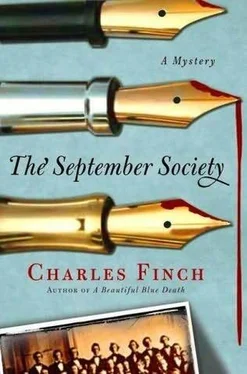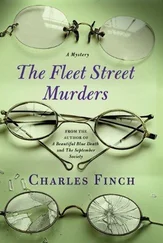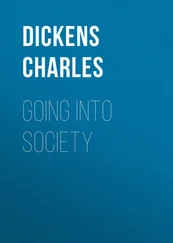Charles Finch - The September Society
Здесь есть возможность читать онлайн «Charles Finch - The September Society» весь текст электронной книги совершенно бесплатно (целиком полную версию без сокращений). В некоторых случаях можно слушать аудио, скачать через торрент в формате fb2 и присутствует краткое содержание. Жанр: Исторический детектив, на английском языке. Описание произведения, (предисловие) а так же отзывы посетителей доступны на портале библиотеки ЛибКат.
- Название:The September Society
- Автор:
- Жанр:
- Год:неизвестен
- ISBN:нет данных
- Рейтинг книги:4 / 5. Голосов: 1
-
Избранное:Добавить в избранное
- Отзывы:
-
Ваша оценка:
- 80
- 1
- 2
- 3
- 4
- 5
The September Society: краткое содержание, описание и аннотация
Предлагаем к чтению аннотацию, описание, краткое содержание или предисловие (зависит от того, что написал сам автор книги «The September Society»). Если вы не нашли необходимую информацию о книге — напишите в комментариях, мы постараемся отыскать её.
The September Society — читать онлайн бесплатно полную книгу (весь текст) целиком
Ниже представлен текст книги, разбитый по страницам. Система сохранения места последней прочитанной страницы, позволяет с удобством читать онлайн бесплатно книгу «The September Society», без необходимости каждый раз заново искать на чём Вы остановились. Поставьте закладку, и сможете в любой момент перейти на страницу, на которой закончили чтение.
Интервал:
Закладка:
Hall was still open for breakfast, and there were loose groups of students framed in the windows, eating, studying, and lingering until classes began.
He took a walk around the Grove Quad and the Fellows’ Garden, thinking. Each of the lads would miss a tutorial today; they hadn’t been at meals for some time; their friends, beyond Stamp, would begin to mark their absence. The police would have to be involved, he thought. He would write them from London.
He went to Stamp’s room and knocked on the door.
“Had your collections?” Lenox asked him.
“Yes,” said Stamp, pushing his blond hair away from his face as he constantly did. “Brutal. We had a question on Cromwell’s protectorate that you wouldn’t believe. I couldn’t even understand it, much less answer it. Some bother about predestination and right rule and I don’t know what.”
“It’s over, at any rate.”
“Yes. I wish this matter with Dabs and Payson weren’t going on, or I could have a drink to celebrate.”
“Has anything further come to you? Perhaps a conversation with one of them? Or a trip they had talked about?”
“The only thing I thought of after you left yesterday was that Dabney sometimes talked of getting digs in London after we leave Oxford, the three of us. It couldn’t possibly be related, but he did talk it over a good deal.”
“Were they spontaneous?”
“Not exceptionally, and I would be surprised if they had done something off the cuff without me.”
“What do you think of your head porter here? Reliable fellow?”
“Red?”
“Is that his name?”
“Well, we call him that. His real name is Kelly. He’s Irish, though.”
“Ah.”
“I don’t know if I’ve heard anyone call him his real name in my life, other than the junior dean or the chaplain or some dour chap like that. The lads’ mothers.”
“Is he reliable?”
“I should say so, yes. Pretty steady with us, doesn’t make trouble if you’re a moment or two past lock-in. All of the porters around the college belonged to one company in some regiment of the army-can’t remember which, maybe the Royal Pioneer Corps?-and we got more or less lucky. Nice chaps. The worst is at Queen’s, down the lane. They have the Scots Guards. Absolute dragons, they say. It’s a pretty miserable lot over there anyway. The students, I mean.”
“Have you thought about my advice? A spell at home?”
“I’ve thought about little else. More about that than Oliver Cromwell, unfortunately. Or Charles II and the Restoration or Dryden as court poet or anything like that.”
“I’m sorry to hear it.”
“Well, it’s not ideal, but I do appreciate it. I think I’ll go to see my aunt in London for five days-until my next tute. They’re good about letting you use the British Library there, if you run into the right librarians. My aunt doesn’t have a world-class collection of modern histories, unfortunately.”
Lenox laughed. “I’m glad to hear you’ll be safe down there,” he said. “I’m leaving in an hour if you’d like to share the train.”
“Nice of you, but I’ll go this afternoon. Have to send a few hours’ warning.”
Lenox handed Stamp a card. “Please come see me if you like, or if you think of anything. I live round St. James’s Park.”
“I say, that’s decent of you. I shall.”
They said good-bye, and Lenox went up to George Payson’s room again.
It had been tidied since yesterday, books straightened, old tea removed, boots cleaned, so Lenox went back downstairs to find the head porter.
He was a man of middling size wearing a black suit and a pair of thin silver spectacles that were just perched on his nose. When he spoke there was no trace of his country of origin, and his hair was in fact black, not red. Some long-graduated student’s idea of an Irish joke.
“Mr. Kelly?” Lenox said.
“You’ve found me-but call me Red.”
“I’m Charles Lenox.”
“Ah, Mr. Lenox. How do you do?”
“Not badly, thanks. May I ask a housekeeping question?”
“Certainly.”
“Did you know that the scout had cleaned George Payson’s room since yesterday?”
“Yes, as usual.”
“He hadn’t for two or three days prior.”
“True enough-at the student’s special request. But it had been two days since we cleaned it.”
“Is it common for students to request that the scout not clean their rooms?”
“Not uncommon, if they’re studying for an exam and have their papers and things as they like. Or if they’ve lost something.”
“Did Payson ask you or his scout?”
“His scout. I would have discouraged the lad.”
“Why did you ask for it to be cleaned today?”
“As I say, I discourage it as a policy. A porter’s second concern is always cleanliness in the college.”
“His first?”
“Security.”
Lenox thought it best not to point out the irony of this. “To be sure. How did you discover that the room was untouched?”
“From the scout himself. I get weekly reports, and it so happens this morning was his.”
“Any ideas about Payson’s whereabouts?”
“I should say on a trip to London. He didn’t report it, but again that’s not entirely uncommon. We try not to send students down for relatively minor infractions like that any longer.”
“Wise policy. Different than my day.”
“Times change.”
“Can you think of any other places where Payson might have gone?”
“I’m afraid I can’t, no.”
“Thank you, Mr. Kelly.”
“Call me Red, as I say,” he said.
“Well, in that case, thank you, Red.”
“Pleased.”
Lenox wandered down Broad Street, its bookstores and cafes busy with students from the nearest colleges-Trinity, Wadham, Jesus, and Lenox’s own, Balliol-and thought over the case.
When he boarded the train he was still thinking, and as it began to move he asked himself: Could it be a coincidence that Payson had left the odd assortment of objects on his floor and then asked to have his room left alone?
More important, he thought as he gazed out over the low, misty fields south of Oxford, set back from the Thames: Could it be a coincidence that all of the objects-the pen, the long, frayed string, and, of course, the tomato-were the color red?
CHAPTER THIRTEEN
H e arrived at Paddington just in time to have a late lunch at the Marlborough Club, where he ran into several people he knew. After speaking with them he sat in the long front hall, whose windows looked out over the street from just a few feet above it, and wrote a letter to the Oxford police, stating the case as he saw it.
In his heart he felt guilty for leaving Oxford, and this letter helped defray that guilt. He wasn’t proud of his return to London, however brief he made it, but he felt that he had to see Lady Jane.
A September breeze blew mildly down the streets, which were sparkling and slippery after a morning rain. Lenox sent a message to Graham asking for the carriage to come round. It gave him time to sit in the club and smoke a pipe waiting for it. In fact, if he were honest with himself, he didn’t truly want to go back to Hampden Lane straight away.
His friend Lord Cabot had taken the afternoon away from the House of Lords, and the two men sat talking about politics, Cabot excitedly disagreeing with Lenox’s every word, leaning forward, both hands on top of his cane, which he occasionally stamped if he was making what he thought to be an especially salient point.
He left for home a little while later, peering thoughtfully through the window of his carriage. Funny how he disliked to leave London even for a day, even to go to a place he loved as much as Oxford. Was it because of Jane, he asked himself? Because he was an old bachelor, set in his ways? The only place he could truly stand to visit was Lenox House, and that because Edmund lived there and Lenox himself had spent the first years of his life there.
Читать дальшеИнтервал:
Закладка:
Похожие книги на «The September Society»
Представляем Вашему вниманию похожие книги на «The September Society» списком для выбора. Мы отобрали схожую по названию и смыслу литературу в надежде предоставить читателям больше вариантов отыскать новые, интересные, ещё непрочитанные произведения.
Обсуждение, отзывы о книге «The September Society» и просто собственные мнения читателей. Оставьте ваши комментарии, напишите, что Вы думаете о произведении, его смысле или главных героях. Укажите что конкретно понравилось, а что нет, и почему Вы так считаете.












